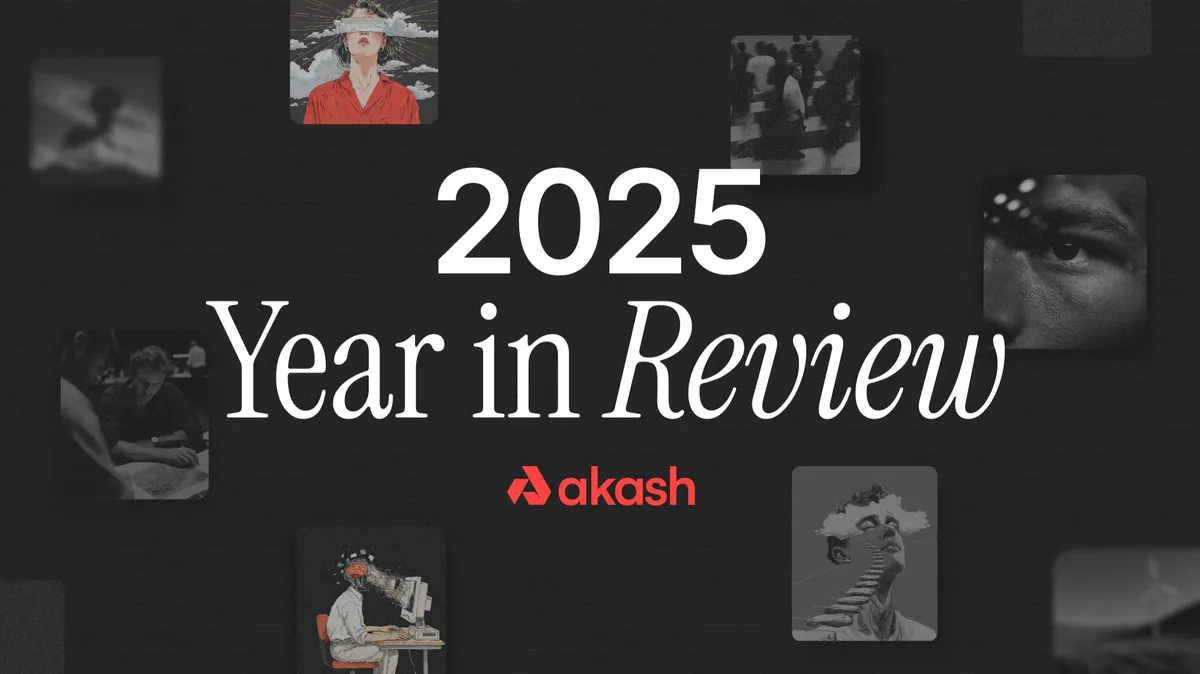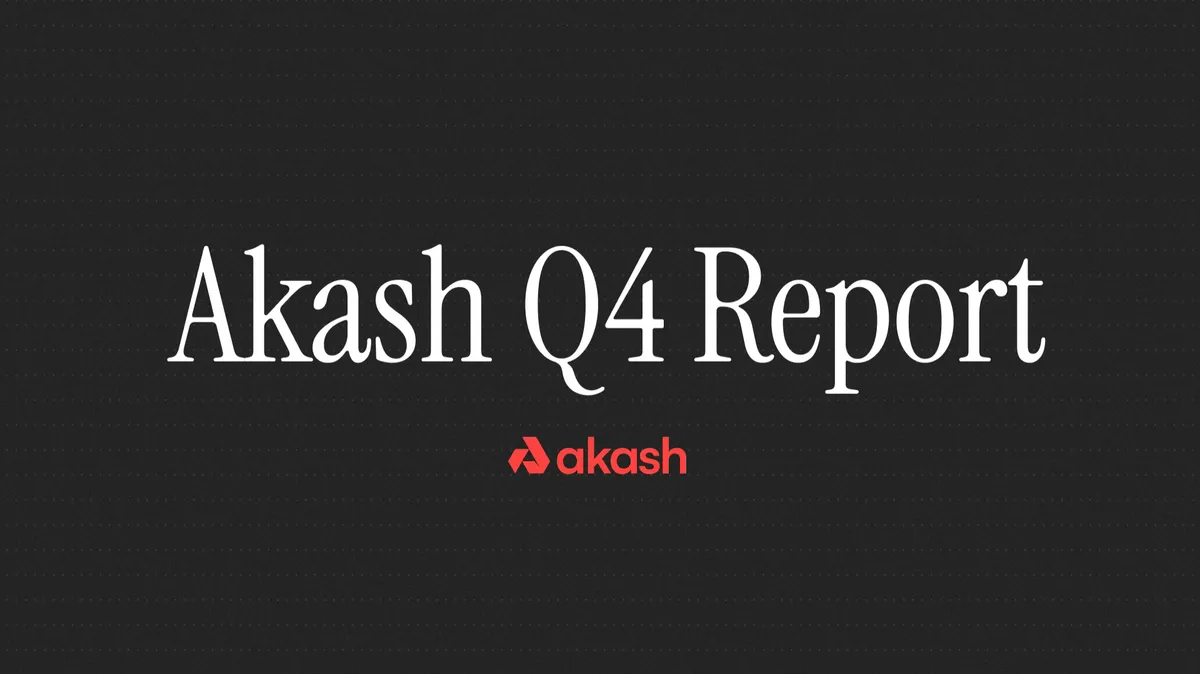
Welcome to another Akash Weekly from the team at Overclock Labs.
Our guests this week:
- Tor Bair, Founder, Secret Foundation
- Anthony Rosa, Project Lead at Moultrie Audits
Mainnet 4 update
We are three weeks away from the launch of Mainnet 4. As of this week, the code is frozen, and we are working on simulating the upgrade so that we are up and running smoothly on launch.
Stay tuned to Akash’s social media channels and this newsletter for more updates on Mainnet 4 as we get closer to the final upgrade date.
Once Akash upgrades to Mainnet 4, we will have created the first open marketplace for IP addresses. This will bring even more flexibility and utility to tenants on Akash network, and providers will have yet another way to monetize their unutilized resources.
Beyond the Mainnet 4 upgrade, we have our eyes set on bringing an open marketplace for GPUs to Akash. Stay tuned for more.
Greg Osuri will be speaking at DCENTRAL Miami
DCENTRAL Miami is coming up next month, from November 28-29th. Greg Osuri will be speaking, and we’ll give an update on the exact date and time when it’s available. If you haven’t gotten your tickets yet — use code FREN30 at decentralcon.com for 30% off.
Moultrie Audits places first at the DoD’s BRAVO Hackathon
Our first guest this week was Anthony Rosa, Project Lead at Moultrie Audits — which is the auditing arm of Moultrie Cryptography. Moultrie Audits focuses on Akash Network, auditing providers to give users more information and help open the network to organizations and industries with stringent security requirements.
Moultrie Audits build smart contracts for funds, crypto companies, grants, and for the government. They currently have active projects in all of these categories.
The history of the BRAVO Hackathon
The BRAVO Hackathon, created by Stuart Wagner (chief digital transformation officer for the Department of the Air Force), takes its name from Project B — a “1921 series of joint Army-Navy target exercises conducted on surplus ships in response to Army Brig. Gen. Billy Mitchell’s claim that bombers sink battleships.”
“Styled off Project B, BRAVO hackathons are sponsored by senior DoD leaders to provide technical and cultural innovation environments that enable government and industry to test and validate bold ideas on real DoD data. These events align under Air Force Chief of Staff Gen. CQ. Brown, Jr.’s Sept. 17, 2021, memo requiring senior leaders to enable Airmen to experiment and innovate.”
- “Introducing BRAVO: A hackathon series for Air Force, industry”
BRAVO 1
According to Wagner, the BRAVO 1 hackathon was likely the largest and most complex data and software innovation event in the U.S. Department of Defense’s history.
There were a total of 16 judges, including dozens of guests from the DoD, and the final presentation was made to a three-star general.
Why Moultrie chose Secret Network and Akash Network for their project
Although many of the specifics of the application are unable to be disclosed for security reasons, Rosa was able to give a high-level overview of the intent of the application.
Moultrie sought to build an application that allowed for the secure transfer of information within the government, preventing the accumulation of troves of inaccessible data — which has to be analyzed at some point in the future.
Both networks were chosen for being best-in-class for their respective solutions. Secret Network was selected as the best solution for keeping data private on-chain.
Akash Network was chosen as the best solution for allowing the government to access information within its system without requiring more information than a wallet address.
Placing First in BRAVO 1
Moultrie’s application won first place in the category “Most Tactically Relevant for Maintenance Data.”
It placed second for “Most Tactically Relevant for Cyber Operations.”
There is full intent to move this project to the NSA to continue development and make it operational. Moultrie is currently in negotiations around the process of transferring the application for further development.
Decentralization needs privacy. Privacy needs decentralization.
Tor Bair is the Founder of Secret Foundation. Secret Network is the only layer-1 blockchain with privacy-preserving smart contracts live on mainnet, which expands on the idea of transactional privacy.
Secret Network exists to support both privacy and decentralization, as both are core to the mission of the network. Bair notes that one is not possible without the other.
“As much of the stack needs to be as decentralized as possible.” — Tor Bair
Building at every level of the stack
Secret Network’s expertise is around building privacy solutions. Learn more about Secret’s roadmap here.
Once combined with solutions like Akash Network, we will start to see the full decentralized stack needed to build a fully private, decentralized web3.
“We’re proud to be a part of the small coalition of blockchain builders that are building things that are truly globally useful and not just built for speculation.” — Tor Bair
Q&A
Q: Are there plans for the U.S. government to run providers on Akash? A: Rosa notes that although he can only speak for very specific parts of the DoD, he does believe that it is the intent of specific departments within the DoD to run providers at some point in the future.
Q: What are the biggest challenges in building web3 solutions for governments? A: (Rosa) The best thing that companies in the web3 space can do is have someone within the company familiar with the government processes needed to get approval. It also helps to have people within the government familiar with the project or company.
Q: (For Greg Osuri) What are your thoughts on Aptos? A: Greg notes that there is a lot of hype around the network and that there may be overlap in the future around running Aptos nodes on Akash. We’ll keep an eye on Aptos going forward.
Listen to the full recording of this week’s Akash Weekly Twitter Spaces.


